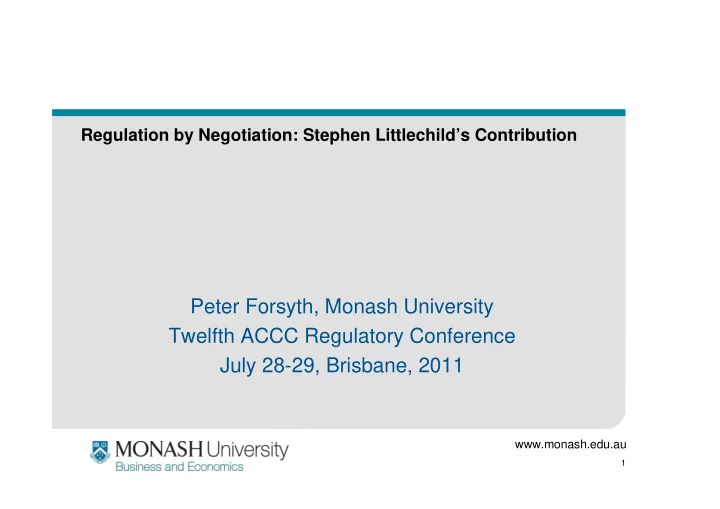

Regulation by Negotiation: Stephen Littlechild’s Contribution Peter Forsyth, Monash University Twelfth ACCC Regulatory Conference July 28-29, Brisbane, 2011 www.monash.edu.au 1
Issues What is the importance of benchmarking in a light handed system of regulation? Options for Light Handed regulation How well will Light Handed Regulation work when airports are subject to demand greater than capacity? www.monash.edu.au 2
1 Benchmarking- Do we need it? • Littlechild sceptical? • The issue-benchmarking performance in terms of prices, profits, costs and productivity • The need for benchmarking is controversial in Australia • This issue is highlighted with the Productivity Commission Review • Airports are difficult to benchmark • But not that difficult • Overseas- several studies academic, consultant • But not for Australia www.monash.edu.au 3
Benchmarking the System • How well does the Australia system work as a whole? I think OK- • • But I don’t really know • But it is possible to find out • How has productivity changed over the last ten years? • How did productivity change when airports were price capped (1997-2001)? • The PC has a lot of experience in benchmarking • Can it make a credible assessment of the performance of the system if it does not consider all the evidence? www.monash.edu.au 4
Benchmarking Performance • Has the performance of the individual Australian airports been good or bad? • A task for the PC review, taking into account government Aeronautical Pricing Principles of 2007 • Are individual airports producing efficiently? • Are they allowing costs to rise? • Are the prices of Sydney Airport consistent with productive efficiency? • Has Adelaide Airport invested excessively and thus put up its prices? www.monash.edu.au 5
2 Options for Light Handed Regulation • There are several aspects to light handed regulation • Not all need be present www.monash.edu.au 6
What is Light Handed Regulation? • Not the same as deregulation • No ex-ante price path set • Criteria for poor performance- and sanctions? • Dispute resolution mechanism? And criteria? • An efficiency test- if it is efficient, then it is OK? (PC,2002; Costello, 2007) • Emphasis in negotiation between parties (eg airlines and airport) • More flexibility for the seller over prices www.monash.edu.au 7
Two Models of LH Regulation 1 Principles and Review An independent body reviews performance according to set principles and if performance is not satisfactory, a sanction is impose (eg, regulation) 2 Negotiate and arbitrate Parties negotiate and if necessary and independent arbitrator is called in (preferred by Littlechild) Substitutes- which is better? www.monash.edu.au 8
Principles Approach • The current Australian approach (with a little bit of help from IIIA) • Principles need to be clear (are they)? • What sanctions for poor performance- are they credible and sufficient? • Assessing performance is essential- i.e., benchmarking is essential • Dispute resolution not needed www.monash.edu.au 9
Negotiate/ Arbitrate • Independent dispute resolution essential (Littlechild) • Less need for benchmarking • Approach favoured by ACCC, airlines • Need to specify criteria for the arbitrator carefully • To avoid too active an involvement by the arbitrator • But not pricing principles www.monash.edu.au 10
The Choice? • Both can have dangers • Such as degenerating into cost plus regulation • If present system is continued, needs to be more attention paid to principles and sanctions www.monash.edu.au 11
3 Light Handed Regulation and Excess Demand • Sydney will be the first (later Brisbane) • No other airport has been subjected to LH regulation and excess demand • Some airports have excess demand, and are subjected to price caps and R of R regulation • Such as London, Paris • LH regulation means that several issues will develop at Sydney (and Brisbane) • What implications for the various versions of LH regulation? • Will negotiation work efficiently? www.monash.edu.au 12
The Long Run Problem • Short Run problems can be handled OK • Will the airport face incentives to invest efficiently over the long run? • Leave aside planning, political and site selection problems www.monash.edu.au 13
Investment • Fig 1 shows the case of additional investment • With D1, investment is worthwhile • Even though LRMC rises from LRMC1 to LRMC2 • In SR price is P1 (landing charges or slots) • Efficient to increase capacity from K1 to K2 • New price = LRMC2 www.monash.edu.au 14
$ C P 1 P 3 LRMC 2 P 2 P 4 D LRMC 1 K 1 K 2 Output www.monash.edu.au 15
Under LH Regulation • At P1, (airport gets the rents) airlines would favour investment • Would like to have prices at P2 • As do passengers • But airport would prefer to have a price of P1 (subject to elasticities) • Investment does not go ahead www.monash.edu.au 16
If Airlines have Some Power... • Airport can offer a price of P3 to the airlines • Then the airlines gain slot rents • Which are NOT passed on to their passengers • Airport gains profits • Airlines gain profits • So both airlines and airport prefer K1 to K2 • But passengers are worse off compared to K2 • Because of the slot system, the customer - the airlines- gains scarcity rents www.monash.edu.au 17
Are Airline and Passenger Interests Aligned? • No incentive for airlines and airport to negotiate an efficient solution • In this case, airline and passenger interests are not aligned • Is the buyer of airports services the airline or its passengers (normally it does not matter)? • Both the airport and the airline will argue “expansion is not needed” • Under LH regulation, efficiency does not come about • (Did this happen with BAA’s London Heathrow airport?) www.monash.edu.au 18
Achieving Efficient Investment • Need some mechanism to ensure investment • Periodic (simple) cost benefit analyses to determine whether airport’s performance is acceptable? • Let’s face it, there will be CBAs done to determine if major capacity investments are needed www.monash.edu.au 19
Thank You! peter.forsyth@monash.edu http://users.monash.edu.au/~pforsyth/index.html www.monash.edu.au 20
Recommend
More recommend